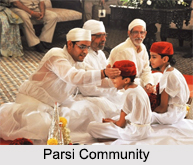 Parsi Community in India follows Zoroastrianism and is originally from Iran. They are the smallest community in India constituting only 0.006 percent of the population. Zoroastrians are generally divided into two segments of people: South Asian Zoroastrian background known as "Parsis" and those of central Asian background.
Parsi Community in India follows Zoroastrianism and is originally from Iran. They are the smallest community in India constituting only 0.006 percent of the population. Zoroastrians are generally divided into two segments of people: South Asian Zoroastrian background known as "Parsis" and those of central Asian background.
Some Parsis were main figures in establishing the Indian Nationalist movement. They were the pioneers in establishing the modern Indian industry. The rich Parsi families contributed enormously to establish institutions of all kinds in India. Even today some of the bigger finance houses in India belong to followers of this religion.
History of Parsi Community
The history of the Parsi Community is around 3000 years old. The migration of the original group of Parsis to Gujarat (now in Pakistan) occurred around 7th Century AD. This community has been consolidated by some eminent Parsis. Their names have been immortalized in its history.
When the Parsi followers of Zoroastrianism fled to India from religious persecution in Iran, they approached the Hindu king, Jaddi Rana, for shelter. The king provided them with land for building the first fire temple at Sanjan (in Gujarat) and placed them and their successors under an everlasting debt. By contributing to the progress of the land of their adoption, the Parsis may be said to have repaid that debt in ample measure.
Society of Parsi Community
The many sided and characteristic philanthropy of the Parsis has established, through their panchayat system, a remarkable social security system for the community. Its members make their contributions to the local anjuman fund or community chest, which constitutes the base of the system. At the apex is the Parsi panchayat of Mumbai which attends, as far as possible, to the community`s needs in the relief of poverty, assistance in education, provision for medical relief and others. The community has many trusts and foundations, benefiting non-Parsis as well.
The Parsis have laid claim to no territory and to no special rights for themselves. Their sense of fair play and their philosophy of life to live and let live, which they have always practised, make them look at human relationships with a dispassionate eye.









